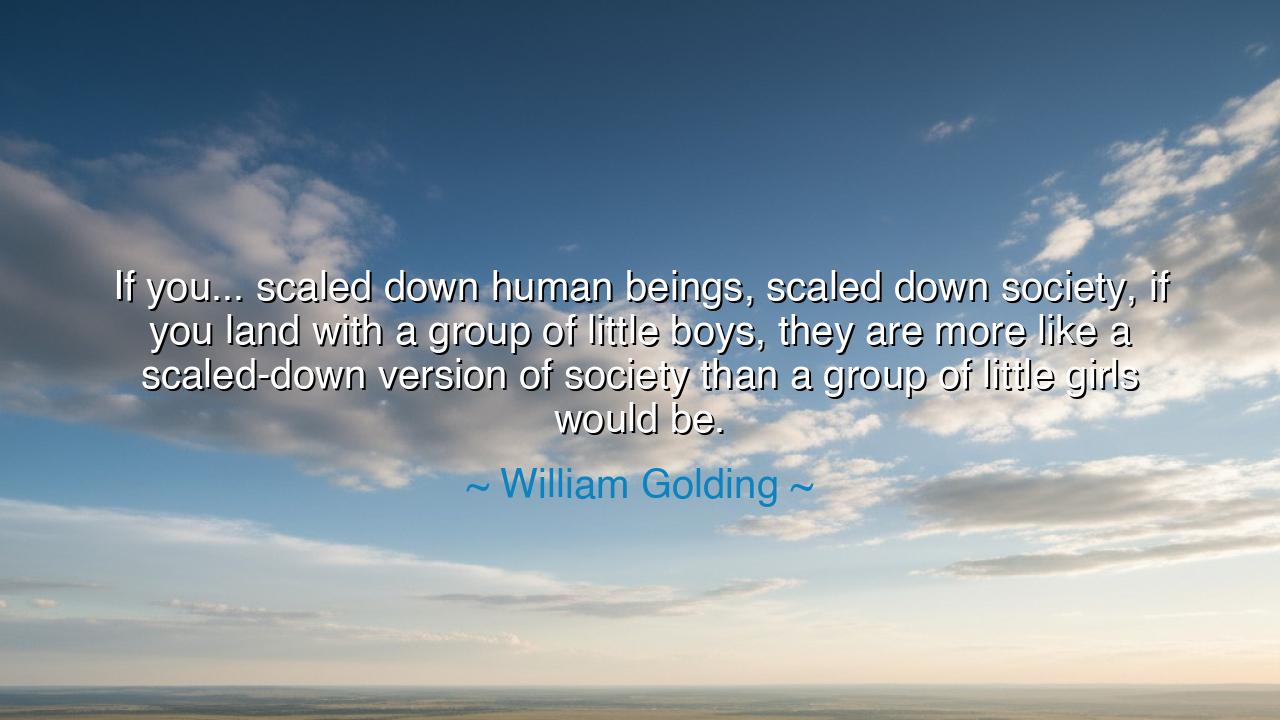
If you... scaled down human beings, scaled down society, if you
If you... scaled down human beings, scaled down society, if you land with a group of little boys, they are more like a scaled-down version of society than a group of little girls would be.






Hear, O seeker of understanding, the words of William Golding, the chronicler of the shadows within mankind’s heart: “If you… scaled down human beings, scaled down society, if you land with a group of little boys, they are more like a scaled-down version of society than a group of little girls would be.” These words arose not from idle thought, but from the reflection of a man who had seen war, who had known the cruelty and chaos of human nature, and who sought to capture it in his great work, Lord of the Flies. Here he declared that within the innocence of children, particularly of boys, lies a mirror of the greater world: ambition, conflict, order, violence, and the eternal struggle for power.
The ancients too spoke of such things. They knew that the heart of man is not pure clay, easily molded, but a storm of desires, fears, and rivalries. In boys, still unshaped by the full weight of civilization, these forces erupt more openly, unchecked by the tempering of nurture or the discipline of age. Thus Golding saw in boys a closer reflection of society’s raw essence: its yearning for leaders, its division into factions, its descent into rivalry and violence when order is broken.
Consider the tale Golding himself gave to the world. In Lord of the Flies, a group of boys, stranded without adults, sought first to build rules, to appoint leaders, to maintain the flame of hope. Yet as days passed, their bonds dissolved. Fear bred superstition, rivalry bred violence, and reason gave way to savagery. The boys, in their small island world, replayed the struggles of empires: the rise of power, the fall of order, the triumph of chaos when virtue is not held firm. In their story, Golding offered us a warning—society scaled down is still society, with all its dangers laid bare.
History too reveals this truth. In the Spartan agoge, where young boys were raised for war, one may see the miniature of a militarized society. Trained in discipline, endurance, and violence, they mirrored the state itself—unyielding, fierce, and bound to conflict. In their games and contests, they rehearsed the struggles of armies and the order of the city. Here again, the raw energy of boys reflected the larger patterns of the world around them.
Yet Golding did not speak merely to exalt boys or diminish girls, but to unveil the closeness between male society and the structures of power, conquest, and order that have long dominated human history. He saw in boys the miniature of politics, of war, of mankind’s darker impulses—an unfiltered vision of the struggles that shape civilizations. It is not that girls are free of conflict, but that their bonds, nurtured more often through cooperation, did not seem to him the same mirror of the world’s harsh order.
O child of tomorrow, let this truth be your teacher: in the small, you may glimpse the great. Watch the play of children, and you will see the seeds of nations. In their alliances, their quarrels, their striving for dominance, you see the story of kings and parliaments, of wars and treaties. Thus Golding’s words remind us that the essence of society is not only written in books of law or carved in stone, but lived first in the heart of the young.
Therefore, guard your heart, and guide the young with wisdom. Teach them justice, teach them mercy, teach them to master the storm within. For if left unshaped, the raw impulses of childhood can swell into the violence of adulthood. But if nurtured with care, the young may grow to reflect not society’s savagery, but its highest ideals.
So I say unto you: heed Golding’s wisdom. In the mirror of boys, we glimpse the unvarnished truth of society itself. Do not despise the lesson, but learn from it. For if we would have a nobler world, we must begin by shaping nobler hearts, that the future may reflect not the chaos of the wild, but the harmony of the just.






AAdministratorAdministrator
Welcome, honored guests. Please leave a comment, we will respond soon